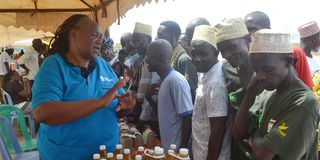Trade fair teaches farmers how to make more money from crops

Margaret Njeri, an exhibitor from Nanyuki explains to farmers how to process cooking oil from sunflower at the Hola Catholic Grounds in Tana River
Farmers in Tana River are banking on the first ever trade exhibition in the county to learn about value addition and seek new markets for their produce after years of exploitation by middlemen.
Farmers’ organisations have been seeking direct access to external markets for cash crops without going through middlemen.
Tana River is known for the best mangoes for pulp, honey, seeds for a variety of cereals, sunflower, cotton and watermelon.
"We sell our mango fruit to middlemen, who demand Sh3 for a fruit that they later sell for a profit of more than Sh17. It demoralises us," said Mr Mohammed Maro.
There have also been claims that some brokers manipulate prices to the disadvantage of growers.
More than 400 farmers have become labourers on newly leased farms to earn a living.
However, the first ever trade exhibition held in Hola has revealed new opportunities in the market.
The fair, which attracted farmers from Nanyuki, Kagumo and other parts of the country, saw farmers learn about value addition for their agricultural produce.
They were trained on how to convert raw materials into finished products that could earn them more money.
Among products exhibited were sunflower oil, canola oil, canola cakes for animal feeds, and sunflower cake feeds for livestock.
Farmers were also taught about branding and marketing.
"If only we knew it was this easy, we would be millionaires today. I have noticed that nothing goes to waste. Everything from the farm is useful," said Mr Ali Komora.
He said the lack of exposure and the county's failure to support agricultural commerce are the main reasons their incomes have remained low.
Mr Komora noted that whereas other counties are focusing on inspiring value addition for their farm produce, the Tana River leadership still dwells on food security, which is a national agenda.
“We local farmers need money in our pockets as we have the potential but lack the knowledge on how to go about it. We are used to the old ways while others are exposed to more advanced agricultural processes," he said.
Ms Halima Koro, a farmer, described the exhibition as a wake-up call for the county administration to invest in training local farmers on value addition and inspiring the development of small industries.
This, she said, will eliminate the exploitation of farmers by middlemen, expand markets for their products and bring huge returns.
"Currently, we have a defined market for sunflower, maize, and our mangoes, and that market is limited to about 200 farmers at a specific price. If we can start producing juice, flour and cooking oil, farmers will set the market prices to their benefit," she said.
Ms Koro encouraged farmers to adjust their ambitions in their respective cooperatives and start processing and packaging agricultural products for the market.
Among other products, farmers have been advised to venture into producing fertiliser, livestock nutritional supplements, and soluble pesticides that cost little to produce and require simple knowledge to make.
Trade fair Coordinator Thomas Wambua, from the Anglican Development Services (ADS), noted that it was the first among initiatives geared to bolstering agricultural production in the county.
The event's purpose, he said, is to create a learning platform and linkages among stakeholders in the agricultural sector.
"We want to introduce the Tana River farmer to the players in the farming sector, to open market access for their products and link them to credit facilities and hence inspire their growth," he said.
The event, organised by the Pastoralist Girls Initiative (PGI) and facilitated by German Agro-Action, attracted more than 30 exhibitors from across the country.





